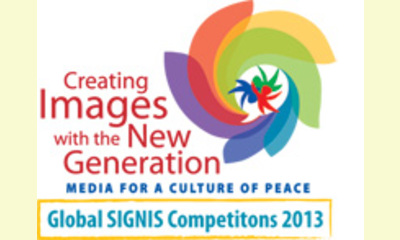|
|
SIGNIS Launches Global SIGNIS Competitions 2013
un articulo por Signis-English
SIGNIS is calling for entries for the SIGNIS Radio, Video and Photo
Competitions 2013. The 3 Competitions seek to
mobilize media practitioners, educators, religious
communities and young people all over the world to
express their vision of a Culture of Peace through
radio production, video-making or photography.

click on photo to enlarge
The SIGNIS Competitions 2013 are open to all, with
an emphasis on young people. Entering the
Competitions can be an individual process or be the
subject of a group activity in parishes, schools,
etc.
Entries will be judged by international juries
according to their message and artistic quality.
The deadline for the Competitions is 10 December
2013, the International Human Rights Day. The
winners of the numerous prizes will be announced
shortly after.
The SIGNIS Competitions 2013 are organized in
parallel with the Global SIGNIS Newspaper Front
Page Project. The objective of this project is
to create a newspaper "Front Page", using a
combination of words/text and drawing/pictures,
that reflects the theme: Media for a Culture of
Peace: Creating Images with the New Generation.
You can follow and share the Competitions on our
special Facebook page: www.faceb
ook.com/signiscompetitions.
Visit our Radio, Video and Photo Competition pages to
find out more!
Enter the Global SIGNIS Competitions 2013 and
express your vision of a Culture of Peace!
(Click here for a Spanish version of this article or here for a French version.
|








|
DISCUSSION
Pregunta(s) relacionada(s) al artículo :
Do the mass media give any attention to the culture of peace?, or just to the culture of war?
* * * * *
Comentario más reciente:
:
The articles from Africa describe good examples, among the rare ones, of media attention to the culture of peace. Not by accident that it is in Africa. In fact, the countries of the North have traditionally tried to keep the countries of the South from having their own media. For some history, see the history of UNESCO's attempt to aid the media of the South.

|
|









